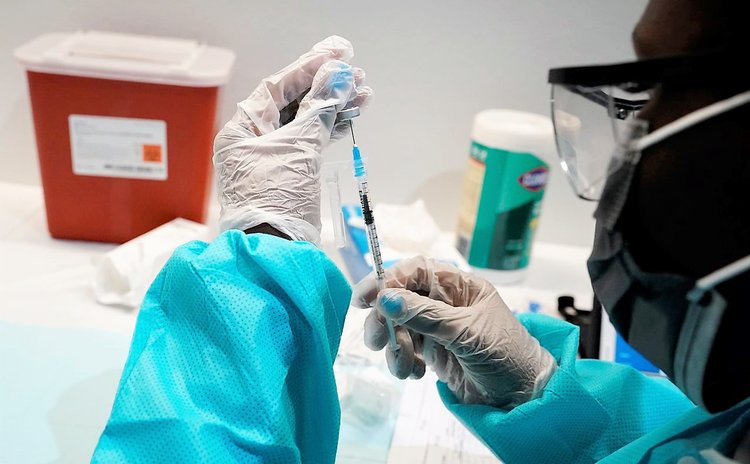Vaccine Discrimination
Many unvaxxed fear what's next for their livelihoods

Tara*, a cashier at a prominent supermarket here, is worried sick that the coronavirus pandemic could take a huge chunk off her earnings, or worse yet, leave her on the breadline, but not for the reasons you might think.
Like thousands of Dominicans, Tara has refused to be vaccinated against the deadly virus. And with a rising number of businesses demanding that their employees take the jab, or be tested regularly, the young woman fears her decision could leave her a bit light in the pocket.
"My workplace asked that we [the unvaccinated] get tested every Monday, I am to report to work at 8:00 [o'clock] daily, but the testing site at the stadium usually starts at nine, and usually it's a long wait, and my manager has indicated that we will not be getting paid for the hours spent while out getting tested," the cashier told The Sun.
Like Tara, Dean*, a construction worker, isn't vaccinated, and is being forced to stay off the job until he is inoculated.
"Last week Thursday when we went to work dem man tell us to bring our card to show we take the vaccine. The next day a few fellas and myself we didn't have a card and the man ask us to get the hell out," alleged the construction worker who's employed with a foreign-owned firm located on the outskirts of the city.
Both Tara and Dean argue that what they are facing is downright discrimination, with the supermarket cashier citing as evidence, the fact that people who are double-jabbed were not being asked to get tested.
"This is totally unfair and to me and this is discrimination against the unvaccinated," she stressed. "I don't have a problem with getting tested, but that rule should apply for the vaccinated workers as well as they could be infected and be spreading it to me."
The latest figures released by the ministry of health as of last Friday indicate that just over 20,500 people here were fully vaccinated, a long way short of the 59,751 people who are eligible, or the 47,800 needed to reach herd immunity, according to the health ministry.
With the Delta variant driving infection numbers up to near unmanageable levels and growing fears of another possible lockdown if the crisis gets out of hand, business leaders here, such as Karl Nassief, the managing director of Auto Trade and Fine Foods, are abandoning moral persuasion and are instead adopting the stick approach to getting workers to get vaccinated.
One salon owner here who has mandated weekly testing for her three unvaccinated staff told The Sun that contrary to the claims of discrimination, she was simply taking steps to protect her two double-jabbed workers and her customers.
The prime minister, Roosevelt Skerrit, has repeatedly assured the nation that vaccination will not be mandatory, although this pledge is proving hollow for workers in the private sector, as the business owners increasingly make it difficult for those who are not inoculated to function.
The country will also by keeping a keen eye on Skerrit to find out if he'll have a change of heart after it emerged that two prominent Caribbean-born jurists had advised the governments of the seven-member Organization of Eastern Caribbean States (OECS), that they had constitutional support for mandatory vaccination.
The Barbados-based Caribbean Media Corporation (CMC) reported last week that the jurists, which CMC did not name, had prepared a 16-page confidential brief titled, "The Legal Dimensions of Mandatory/Compulsory Requirements for COVID-10 Vaccinations, August 2021," advising the OECS leaders, including Skerrit, that the sub-regional countries would be on firm legal grounds in pursuing mandatory vaccination laws even in the face of counter-arguments alleging violations of rights.
"Having demonstrated . . . that mandatory vaccination is constitutionally appropriate given the leeway granted in favour of public health imperatives, it is submitted that employers could justify a requirement in a pandemic context, at minimum where the workplace is a high-risk environment, such as health care, or essential services, or for workers more at risk at the workplace, such as frontline workers interacting with the public," they said.
"It is unlikely that employers would be held to a higher standard than a constitutional standard. This is reasonable both to protect other employees, the interacting public and even the employee himself or herself," the document added.
It's a legal opinion that Thomas Letang, the general secretary of the Dominica Public Service Union (DPSU), disagrees with, arguing that it was "debatable and we should not accept that the law provides for it to be done."
Letang made clear that the trade union movement supported vaccination, but opposed making it mandatory, charging that it meant people would be forced to inject a "foreign object" into their bodies without their consent.
"In case you have to deal with serious complications of that vaccine, which is still in its experimental stage, who takes responsibility for that problem that may arise in the future?" asked the DPSU leader.
*Names changed to protect identities
-By Ronda Luke and Johnson JohnRose




